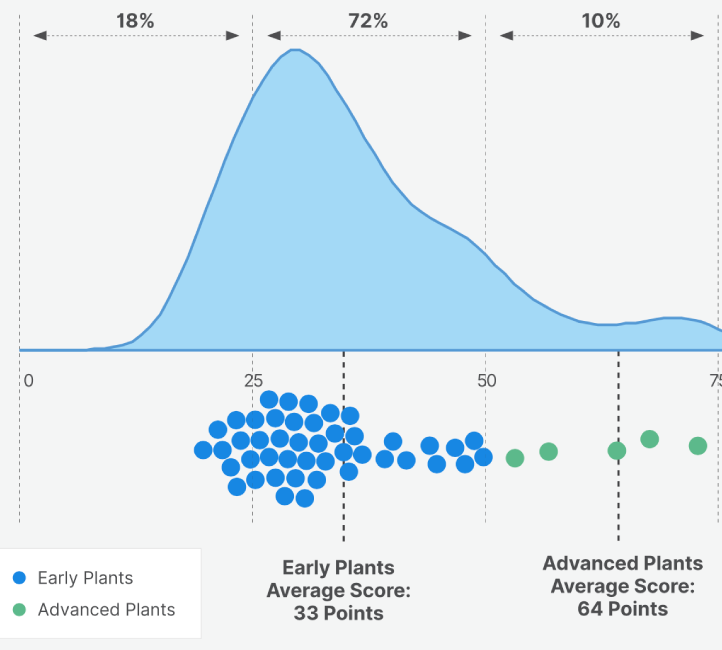The 7 Deadly Sins of Modern Manufacturing
All around the manufacturing world, companies recognize the need to build digital capabilities. And yet, few companies have managed to capture the fourth industrial era’s potential for business growth and market penetration.
Why? Many companies have committed one (or more) of what SmarterChains describes as the 7 deadly sins of modern manufacturing. The purpose of this paper is to give readers the knowledge they need to identify these flawed approaches, and a timely warning to avoid them in the first place.
Sampling Isolated Industry 4.0 Technologies
Manufacturers should think of each Industry 4.0 technology as part of a greater whole. Solutions can work in conjunction with others to unlock and amplify value-creation. Without an integrated approach to technology selection and implementation, success is a rarity and maximum success is almost impossible. For instance, leveraging 3D printing in combination with autonomous robots and big data capabilities is infinitely more powerful than simply experimenting with “in-vogue” 3D printers. In other words, the whole is greater than the sums of its parts.
Focusing only on Technology
Experience has shown time and time again that when it comes to business transformation the human resistance-to-change element is powerful; and often, it shoots down initiatives in their infancy. The same is true in digital transformation. Modern technology feels almost like magic — and the more it advances, the greater the danger of neglecting the human factor to invest in the coolest new toy. This danger is substantial. As factories around the world have learned to their detriment, setting up new systems without securing employee buy-in is a costly mistake.
Lack of transformation continuity
Digital transformation requires vision, strong leadership, and a coherent strategy. Unfortunately, today’s “gold rush” momentum towards digitization comes with competing claims, ever-changing priorities and rushed initiatives. As Industry 4.0 projects fail to meet expectations, CIOs jump ship voluntarily and involuntarily. This hamstrings the company’s ability to execute its long-term digitization strategy, and many high-potential projects get bundled to the failure pile unceremoniously.
Demanding that people become agile and innovative
Industry 4.0 necessitates a new breed of manufacturing leaders and employees that is bold, agile, and tremendously curious. However, just asking people to “be” digital-ready is bound to fail. Instead, companies ought to support the transition towards the Work of the Future model through an orchestrated cultural effort. There are many aspects to this; some broad, like establishing new enterprise-wide goals, and some narrow, like changing language patterns and rituals of success. In either case, culture is a very serious concern that must be addressed at any cost.
Declaring digital success after an isolated victory
Industry 4.0 success depends on the digital maturity of the entire company. Even though victories on individual business lines are great, they don’t mean much on a global scale — and it’s dangerous to think otherwise because overconfidence courts failure. Companies must differentiate between local and global factors, and leverage the digital multipliers they can apply on scale.
Acquiring digital talent without upskilling the existing workforce
Automation, IIoT and Big Data solutions have the potential to boost human productivity massively. However, in practice, the average factory’s workforce needs considerable training just to keep up. This reality makes the option of neglecting to upskill current workers in order to buy new digital-ready talent tempting. Companies must avoid this at all costs. First, because today’s competitive market makes capturing all available talent unlikely. And second, because a workforce that operates on two speeds, a segment of digital-savvy workers and a segment of traditional workers, is for morale.
Not working With SmarterChains
The 7th cardinal and deadliest sin of modern manufacturing is missing the opportunity to work with SmarterChains. SmarterChains’ factory assessment is in-depth, rapid and requires no plant walks. Collecting the client’s input through a targeted but surprisingly user-friendly questionnaire, the company’s proprietary algorithms produce insights on critical dimensions like packaging, maintenance, and quality. As part of the same process, the client receives a granular Factory of the Future roadmap that tames down Industry 4.0 complexity and makes the path to transformation abundantly clear.
 | Factory of the Future Benchmarking StudyIn partnership with EY, we've created a data-driven study providing important actionable insights about the CPG industry’s adoption of digital technologies
|
You might also enjoy:






